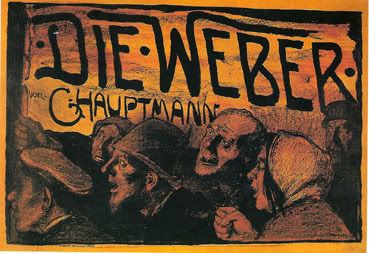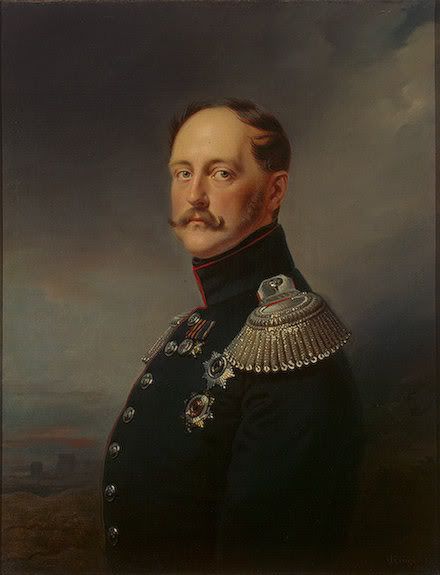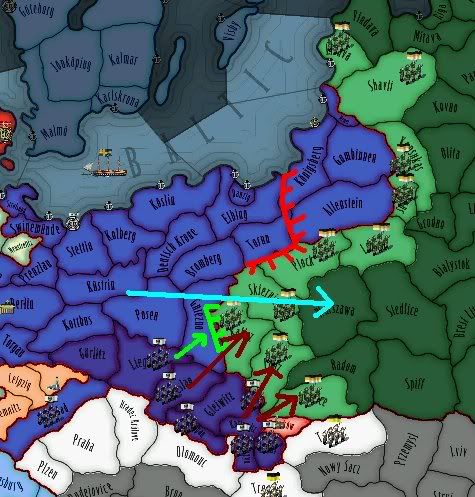To All: Again, no update today, but I promise to write one tomorrow or on friday, whenever I have enough time.
Enewald: And its all because of me Ok, cocky mode off. Prussia, of course, does already have great potential of being a military power at the game start, and I don't let anything hold me back.
Ok, cocky mode off. Prussia, of course, does already have great potential of being a military power at the game start, and I don't let anything hold me back.
comagoosie: Nah, the AI are silly and take me on peicemeal. But don't fear, I have some interesting plans for later on.... very interesting indeed. I hope to spice the game up whenever I can. I have to be careful not to give myself and easy victory, though. Like having France declare war on me and then modding in Russia to fight a war on two fronts when all Russian troops are in siberia... if you get me?
Ahura Mazda: Muskets took a long time to faze out. Russia was still using them in the 1850s... While the Germans were quick to adopt the rifle, the change over from percussion Rifle (as main infantry weapon) to breech-loaded rifles took place in a quite short time space. Musket to rifle took the best part of a century.
Lord_D: I am studying 1984 in English, so that is likely the cause. Well spotted though Better get this doublethink out of my head...
Better get this doublethink out of my head...
Eöl: Do not be so quick to condemn Austria to destruction, that I could most certainly not afford to do. The maintaining of the balance of Europe, ableit with some Prussia superiority, is something I keep as a priority. Don't want to give the French and easy time in Italy or the Russians an easy time in the Balkans now, do we?
ComradeOm, GhostWriter: Perhaps as it would seem, it is the chink in the armour, but then events can always get in the way and Russia can be so conservative about things sometimes. Afterall, Silesia borders Russia as well as Austria...
GhostWriter: I never turn fog of war off, so I have no idea. For all I know they could be a province behind my sight, but alternitively they could be across half the worlds surface. Who know...? (apart from the Russians!)
rasmus40: Thanks for catching up! If you learn something, I will be very happy that I was able to teach. If you ever need something clarfying about the more military aspects of the game, don't be afraid to ask; we don't bite.... except Capibara, he can be pretty vicious
If you learn something, I will be very happy that I was able to teach. If you ever need something clarfying about the more military aspects of the game, don't be afraid to ask; we don't bite.... except Capibara, he can be pretty vicious 
Prinz Wilhelm: Honour to have you, thanks for catching up. I haven't strayed too far... oh no, wait; I have haven't I?

Capibara: If anyone knows already, it would be the Austrians. Perhaps a new enemy must be shown the power of Prussia?
Enewald: And its all because of me
comagoosie: Nah, the AI are silly and take me on peicemeal. But don't fear, I have some interesting plans for later on.... very interesting indeed. I hope to spice the game up whenever I can. I have to be careful not to give myself and easy victory, though. Like having France declare war on me and then modding in Russia to fight a war on two fronts when all Russian troops are in siberia... if you get me?
Ahura Mazda: Muskets took a long time to faze out. Russia was still using them in the 1850s... While the Germans were quick to adopt the rifle, the change over from percussion Rifle (as main infantry weapon) to breech-loaded rifles took place in a quite short time space. Musket to rifle took the best part of a century.
Lord_D: I am studying 1984 in English, so that is likely the cause. Well spotted though
Eöl: Do not be so quick to condemn Austria to destruction, that I could most certainly not afford to do. The maintaining of the balance of Europe, ableit with some Prussia superiority, is something I keep as a priority. Don't want to give the French and easy time in Italy or the Russians an easy time in the Balkans now, do we?
ComradeOm, GhostWriter: Perhaps as it would seem, it is the chink in the armour, but then events can always get in the way and Russia can be so conservative about things sometimes. Afterall, Silesia borders Russia as well as Austria...
GhostWriter: I never turn fog of war off, so I have no idea. For all I know they could be a province behind my sight, but alternitively they could be across half the worlds surface. Who know...? (apart from the Russians!)
rasmus40: Thanks for catching up!
Prinz Wilhelm: Honour to have you, thanks for catching up. I haven't strayed too far... oh no, wait; I have haven't I?
Capibara: If anyone knows already, it would be the Austrians. Perhaps a new enemy must be shown the power of Prussia?





